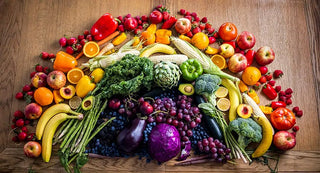Nurturing a Healthy Food Relationship for Performance Athletes
Welcome to Beyond the StEPS
We are joined by the amazing Jess Spinner for our topic. Jess Spinner is a professional dancer turned health coach that helps dancers find a balanced approach to food and the body creating confidence in food choices, body image and their dancing.
As performance athletes, our relationship with food is instrumental in supporting our physical well-being, energy levels, and overall performance. However, cultivating a healthy food relationship can be challenging amidst the abundance of dietary information, societal influences, and personal beliefs. In this article, we will delve into practical tools and strategies to develop a positive and balanced approach to food for performance athletes, expanding upon the given topic.
- Mindful Evaluation of Influences : To foster a healthy food relationship, it is essential to evaluate the influences surrounding us. In today's digital age, social media, TV, magazines, and even well-meaning individuals can shape our perceptions of food. These influences often promote idealized body images or push restrictive diets, leading to stress, comparison, and unhealthy behaviors. It's crucial to critically analyze these influences and their impact on your mental and physical well-being.
Consider engaging in open discussions with those involved or finding ways to tune out negative comments. Surround yourself with positive influences that promote balance, body positivity, and intuitive eating. Seek out athletes and experts who embody a healthy relationship with food and can serve as role models in your journey. Remember, everyone's nutritional needs and preferences are unique, so it's important to personalize your approach and find what works best for you.
- Removing Moral Labeling: A common pitfall in developing a healthy food relationship is the tendency to label foods as "good" or "bad," "healthy" or "unhealthy," "should" or "shouldn't." This black-and-white thinking often leads to extremes and an unhealthy mindset. Instead, adopt a more nuanced perspective that focuses on the nutritional value of foods and their role in supporting your performance and overall well-being.
Recognize that all foods can be part of a balanced diet when consumed in moderation. Rather than categorizing foods based on moral judgments, prioritize their nutrient density and consider how they contribute to your goals. Emphasize the inclusion of fruits, vegetables, whole grains, lean proteins, and healthy fats, as they provide essential vitamins, minerals, and energy. However, allow yourself to enjoy occasional treats and indulgences without guilt or derailing your progress.
- Finding Joy in Nutrient-Dense Foods: While it's important to enjoy the foods you love, it's equally crucial to incorporate nutrient-dense options into your diet. However, this doesn't mean sacrificing taste and pleasure. Explore ways to make healthier choices enjoyable and satisfying by experimenting with different recipes, cooking methods, and flavor combinations.
For performance athletes, finding ways to make nutrient-dense foods as appealing as indulgent treats is key. Start by expanding your culinary horizons and exploring a variety of cuisines. Experiment with spices, herbs, sauces, and dips to enhance the flavors of vegetables and other nutrient-packed ingredients. Try new cooking techniques such as roasting, grilling, or stir-frying to add variety and excitement to your meals.
Additionally, pay attention to the presentation of your food. Beautifully plated dishes can make a significant difference in your enjoyment and appreciation of healthier options. Incorporate vibrant colors and textures into your meals, as they stimulate the senses and make the experience of eating more pleasurable. Engage all your senses when consuming nutrient-dense foods, savoring each bite and fully appreciating the nourishment they provide.
- Cultivating Awareness through Journaling: Journaling can be a powerful tool in developing a healthy food relationship. Taking the time to reflect on your thoughts, feelings, and behaviors related to food can help uncover patterns and create a deeper understanding of your relationship with food.
Start by keeping a food diary, recording what you eat, when you eat, and how you feel before and after meals. This can help you identify any emotional triggers or patterns of mindless eating. Additionally, jot down your thoughts and emotions related to food. Are you feeling guilty, anxious, or deprived? Are there any negative beliefs or associations you have with certain foods?
Reviewing your journal entries can provide valuable insights into your behaviors and mindset around food. Look for opportunities to challenge and reframe negative thoughts or beliefs. Replace self-criticism with self-compassion and gratitude for nourishing your body and supporting your athletic endeavors.
- Seeking Professional Guidance: In developing a healthy food relationship, seeking professional guidance can be immensely beneficial. Consider consulting with a registered dietitian or sports nutritionist who specializes in working with performance athletes. They can provide personalized advice tailored to your specific needs, goals, and dietary requirements.
A qualified professional can help you create a well-rounded meal plan that optimizes your performance, supports your training, and ensures you meet your nutritional needs. They can also address any concerns or misconceptions you may have about food and provide evidence-based recommendations to enhance your overall well-being.
Cultivating a healthy food relationship is an ongoing journey that requires self-awareness, mindfulness, and a commitment to balance. By evaluating the influences around us, removing moral labeling, finding joy in nutrient-dense foods, cultivating awareness through journaling, and seeking professional guidance, performance athletes can develop a positive and sustainable approach to food that supports their physical and mental well-being.
What is one action that you want our listeners to take between now and next week to make progress in this area?
- Start to consider the thoughts that are coming up about food and/or body. Label them as helpful or unhelpful thoughts.
Remember, it's not about achieving dietary perfection but rather embracing a flexible and inclusive mindset that nourishes your body, fuels your performance, and allows you to enjoy the foods you love. With time and practice, you can nurture a healthy food relationship that enhances your athletic journey and promotes a lifelong commitment to well-being.
How can people get in touch with you?
Email for consult: jess@thewholesdancer.com
Website: Thewholedancer.com
Watch Full Episode Here!

